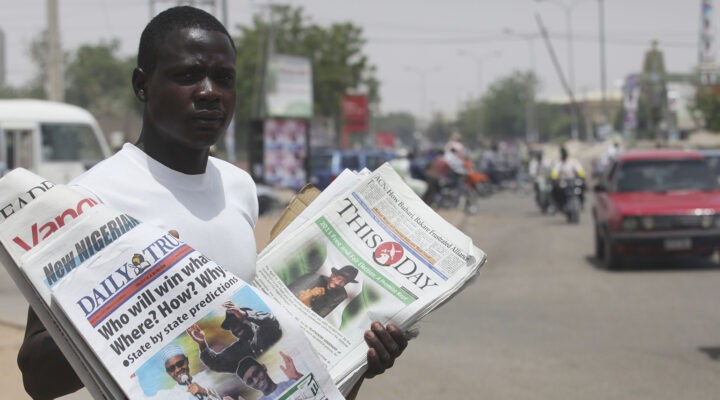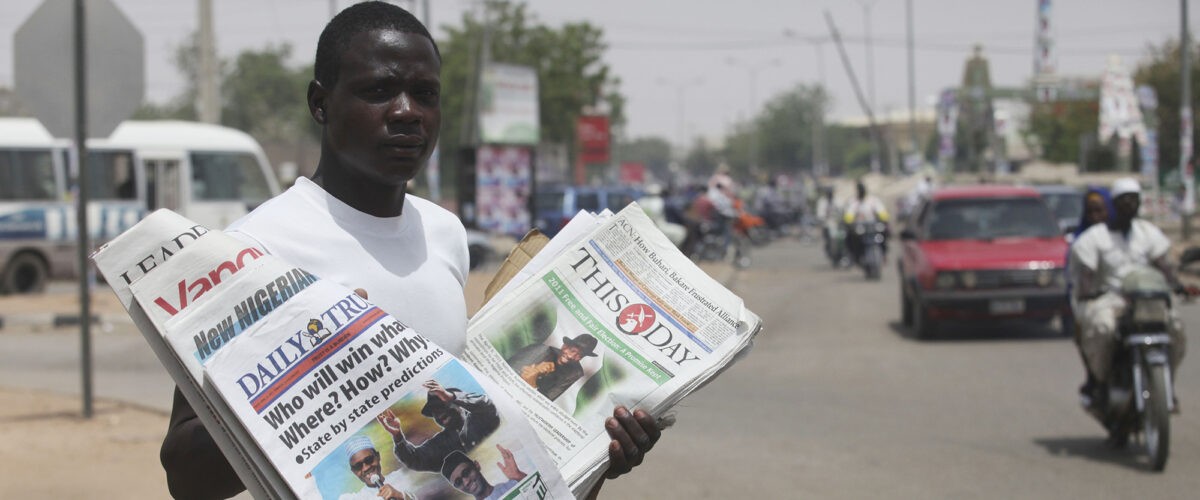In Nigeria, two things matter to many voters about those seeking presidential office: the ethnic background of the aspirants and the religion they profess. In fact, in the calculation of some, the latter is more important than the former.
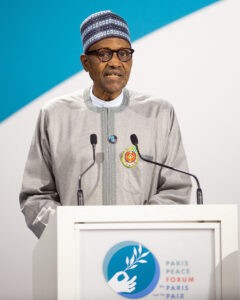
Nigeria President Muhammadu Buhari gives a speech during the opening ceremony of the Paris Peace Forum at The Grande Halle de la Villette in Paris on November 11, 2021. (Photo by Raphael Lafargue/Abaca/Sipa USA Sipa via AP Images)
Ahead of the country’s next presidential election scheduled for February 2023, the issue of who or where the next president should come from already is generating debate in the country as some people, including religious and political figures, have expressed their minds. Will a Christian or Muslim replace Muhammadu Buhari, the current president, come 2023?
Buhari is a Muslim from Katsina State, in the northern part of the country, and, in the view of some people, his successor should come from the south, and not just from the south, but should be a Christian. The northern and southern parts of the country are inhabited by both Christians and Muslims, although a majority of the Muslims hail from the northern part of the country.
A history of shared governance
Since 1999 when Nigeria returned to civil rule after 15 years of military dictatorship, the country’s presidency has rotated between the north and south. On one occasion in 2010, midway into the tenure of a Muslim president, Umaru Yar’Adua, nature disrupted the arrangement, and it displeased some people within the system who only got pacified five years later when Buhari emerged as president.
As successor to Olusegun Obasanjo, a southern Christian, in 2007, Yar’Adua, also from Katsina, died on May 5, 2010, after a protracted illness, and as constitutionally required, his deputy, Goodluck Jonathan, a Christian, was sworn in as president. That displeased some northern Muslims who felt it was still their turn to hold the presidency.
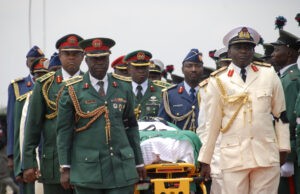
The body of Nigeria’s late President Umaru Yar’Adua is brought to a plane to be transported for burial in his home state of Katsina, at the airport in Abuja, Nigeria, Thursday, May 6, 2010. (AP Photo/Felix Onigbinde)
After completing time as acting president, Jonathan ran in his own right for the presidency and won, but his attempt to seek reelection in 2015 met with defeat. Prior to then, some northerners made it clear they were not in support of his decision to vie for the office a second time, and his defeat by Buhari was a welcome relief to them.
Now, with Buhari’s tenure about to end, the ethnic and religious tensions are playing out again. Although it’s too early to tell what the future holds for those who have declared their intention thus far to run for president — as party primaries to select a flagbearer are yet to be held — some Nigerians believe the issue of rotational presidency should be maintained.
A possible Muslim/Muslim ticket
To that extent, the recent declaration by Bola Tinubu, an influential politician and Muslim from the southern part of Nigeria, to contest the 2023 presidential election is not viewed lightly by some Christians. And it is even more so when some people are now hinting of the possibility of a Muslim-Muslim ticket, which, since 1999, has been unknown in the political firmament.
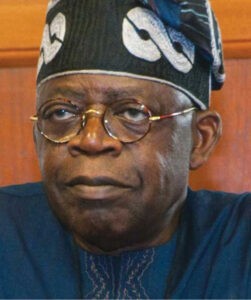
Bola Tinubu
The only time the nation witnessed such arrangement was in 1993 when Moshood Abiola, a wealthy Muslim southerner, teamed up with Babagana Kingibe, a northern Muslim, to contest the presidential election, which they were widely believed to have won but the election never stood as the military administration of Ibrahim Babangida nullified the result.
While the issue of Tinubu’s running mate is unknown yet, some of his supporters — like Abdulmumin Jibrin — even before Tinubu declared his intention to run for the office had argued that who he chooses as running mate doesn’t matter.
To Jibrin, what should matter to Nigerians is the competence of those seeking to serve.
But Bayo Oladeji, spokesman for the president of the Christian Association of Nigeria (CAN) in an interview with Punch newspaper said such a proposition is bad for the country.
“Politicians can talk politics, but we have stated our view,” he said. “Any party that tries a Muslim/Muslim ticket or Christian/Christian ticket will fail. This is not 1993. Even when we have joint Muslim/Christians, the church still goes through hell. Only God knows the number of Christians that have been killed.”
He added: “Imagine how bad it will be if we have two Muslims in power? The constitution promotes religious balance. So, if they want to try a Muslim/Muslim ticket, let them try it. But we will not respond to faceless people. Let any political party or the government try it then they will know that Christians are not secondhand citizens of Nigeria.”
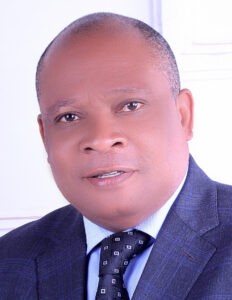
Aloysius-Michaels Okolie
Professor Aloysius-Michaels Okolie, dean of the faculty of the social sciences at University of Nigeria, also believes a Muslim/Muslim or Christian/Christian ticket cannot work in Nigeria in the present moment.
“It will not be feasible, at least within the coming dispensation, to have a Muslim/Muslim or Christian/Christian ticket,” he told BNG. “Mutual distrust and poor handling of diversities by the present administration (of Muhammadu Buhari) have escalated ethnic and religious rivalries which calls for careful and political maneuvering. The future of Nigeria lies in deliberate balancing of the two religious divides. This will de-escalate the already tense situation.”
Religious and ethnic tensions
Some of the ethnic and religious rivalry Okolie talks about results in suspected killings along religious lines.
While the history of religious crisis in Nigeria predates Buhari’s administration, Okolie said the situation worsened under its watch.
“The situation reached its apogee during the Buhari-led government. The escalation of intolerance, disunity and disaffection among ethnic nationalities was occasioned by his poor management of ethnic diversities,” Okolie said.“From his highly skewed style and pattern of appointments and flagrant disregard of the principles of national character in the conduct of government business, coupled with perceived support of one section of the country over the others, the country slowly and steadily receded to ‘a theater of we vs they.’ The level of trust waned to near irretrievability as most government actions are interpreted from ethnic colorations.”
“The level of trust waned to near irretrievability as most government actions are interpreted from ethnic colorations.”
Nothwithstanding, Okolie says the fundamental issue that fuels ethno-regional dissents in the country is “more of religion than ethnicity” as “a majority of the people believe that the government of the day is using the apparatus of the state to foist and hoist Islamic religion and by extension appropriate lands for Hausa-Fulani warriors masquerading as herders.”
This engrained mindset, he added, is at the root of seemingly intractable farmers-herders’ conflicts and insecurity and will help define the 2023 presidential election.
“The reluctance of the government to prosecute the captured invading herders and reckless and inflammatory utterances of government officials that appear to support killings and deprivations lend credence to government complicity,” Okolie said. “In the 2023 presidential election, the critical issue that will influence the electoral outcome is [whether] the candidate [is] from Hausa Fulani extraction. A majority of the people may tolerate a candidate from Muslim extraction but not from ‘rampaging’ Hausa Fulani. The dominant political parties shall be sensitive to the issue of alienation and marginalization of some ethnic nationalities, to assuage deep-seated feelings of self-determination and balkanization.”
Religion weaponized for power
Tajudeen Suleiman, a Nigerian journalist, said religion became an issue in Nigerian politics due to the manipulation of politicians and the fear of some people borne out of the activities of the terror group Boko Haram.
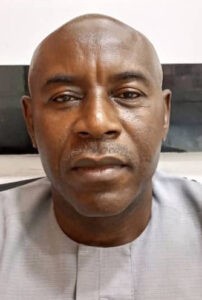
Tajudeen Suleiman
“Most Nigerians [did] not care about the religion of political aspirants until recently due largely to the activities of Boko Haram and how northern leaders have handled it,” Suleiman told BNG. “It has led to suspicion of a plot to Islamize the country [although] there’s no evidence of such plot.”
Nevertheless, “ethnicity and religion have become weapons to be used to get power by the greedy elites,” he added. “Moreover, bad leadership over the years has not allowed the country to realize her full potentials. Unfortunately, only a section of the country has been dominant politically without showing capacity for transformational leadership. This has made the more educated parts of the country very uncomfortable and led to agitation for a power shift.”
Suleiman pointed out that “the declaration of Sharia [law] by some [northern] states and later the activities of Boko Haram and initial support for the group by northern elite have all combined to make religion an important political issue. The interventions of parochial Muslim and Christian clerics in political discussions have further deepened the division.”
While there are some who believe the politics of religion and ethnicity in Nigeria over the years is the bane of the country and accounts for why Nigeria has not developed as it should, Suleiman feels differently.
“Nigeria has failed to realize her potentials largely because of the country’s poor leadership recruitment process and the lopsided nature of our federation where constituent states don’t have control of their resources,” he said. “States can’t also realize their potentials. The country was making progress through the regional governments until the military struck and turned the country [into] a unitary government where everything depends on the center. That is what has slowed this country down, not religion or ethnicity. Those are just manifestations of the frustrations of Nigerians with the system.”
The likely candidates
Tinubu, who’s part of the ruling All Progressives Congress, is not the only politician aiming to occupy the presidential seat. Other aspirants include Dave Umahi, governor of Ebonyi State in the eastern region; Orji Uzor Kalu, a former governor of Abia State and now a senator; Anyim Pius Anyim, former senate president; Dele Momodu, a journalist and publisher; Philip Ideawor, a member of the Diaspora association in the UK; and Khadija Okunnu-Lamidi, currently the only female presidential candidate. The list of candidates is likely to swell in the coming weeks and months.
Anthony Akaeze is a Nigerian-born freelance journalist who currently lives in Houston. He covers Africa for BNG.
Related articles:
In Nigeria, the politics of religion and the search for peace are never-ending

